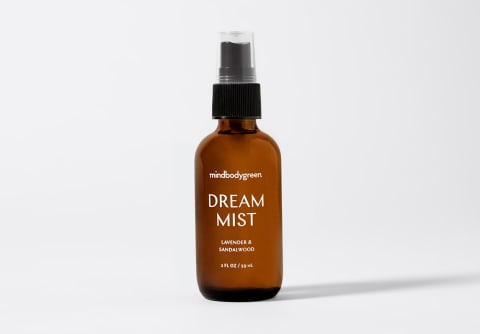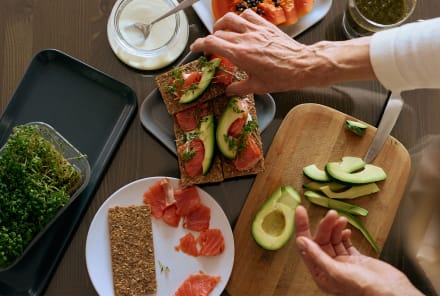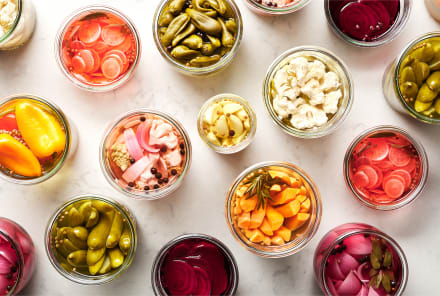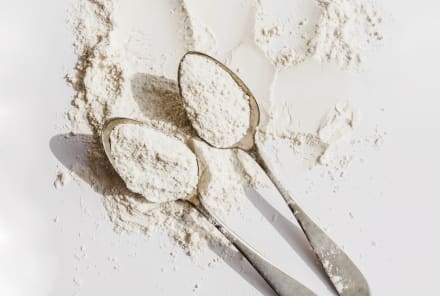Advertisement
15 Ways To Get Good-Quality Sleep (Even If You Aren't Getting Enough)



Good sleep is essential to good health, and getting enough hours in bed is just part of the equation—those Zzz's need to be top-notch to actually benefit your well-being.
According to the National Sleep Foundation, "good" sleep quality means falling asleep within about 30 minutes, staying sound asleep throughout the night with a maximum of one mid-sleep wakeup, and being able to drift back to sleep within 20 minutes of that one awakening.
If all of that sounds like a dream, and instead you're struggling to stay asleep, then your sleep quality needs some work. Here are some healthier bedtime habits—all backed by research and medical experts.
Reduce screen time.
If you scroll through social media before bed or catch up on your favorite shows, you might be exposing your eyes to sleep-disrupting wavelengths. Wavelengths of blue light can throw off the body's natural circadian rhythm1 and increase attention rather than sleepiness, negatively affecting sleep quality.
Unfortunately, blue light can be tough to avoid unless you're making a conscious effort to sidestep it, considering that our computers, smartphones, and all kinds of other electronic devices emit it.
However, there are ways to minimize the effects of blue light without completely giving up on electronics altogether: Turning electronics off before bed, investing in a pair of blue-blocking glasses2, and installing blue-light-reducing apps on your phone and computer can help too.
Take a sleep-supporting supplement.*
Magnesium and melatonin are two popular options for natural sleep supplements.
Magnesium
Magnesium is an essential mineral that has been found to promote relaxation and calm.* In one study, magnesium supplementation had a positive impact on both sleep quality and sleep duration3.*
It is important to note that there are many different forms of magnesium, and getting the right form makes a difference. You'll want to look for magnesium glycinate, which is more bioavailable and has fewer side effects4 than other forms.*
Melatonin
Melatonin is a sleep hormone produced by the brain's pineal gland5 that tells your body when it's time to wind down. Studies6 have shown that a 2-mg dose of melatonin before bed can significantly and positively impact sleep quality, especially in cases of jet lag.* However, it can leave you feeling groggy in the morning, and it's not the best choice for every night use.
Examine your inner monologue.
Getting enough good sleep isn't just about your physical habits—it also hinges on your internal thoughts and attitudes. "Look at the stories you're telling yourself about sleep," says Victoria Albina, N.P., MPH, nervous system specialist and holistic nurse practitioner. "If you're saying sleep is something elusive, then that makes that story stronger in your nervous system, in your body, and in your mind, and physiologically creates more anxiety, which will rev up your sympathetic nervous system and make it harder to fall asleep."
So, how can you create a new narrative around sleep? "During the daytime, when you're not trying to go to sleep, write out your thoughts about sleep and how those thoughts make you feel," Albina says.
"Ask yourself if that's the way you want to keep feeling. If not, then you get to do thought work about it and ask yourself how you want to feel when you're trying to fall asleep and choose different thoughts."
Avoid naps during the day.
It might seem like any chance you can score some sleep is worth taking, but napping isn't the best strategy for getting solid, high-quality sleep at night.
Studies have shown that daytime naps can hinder performance on certain mental tasks7 and increase sleepiness7 during the day.
Every person has unique needs when it comes to naps and sleep, but if you're finding that your nighttime rest is compromised, consider cutting daylight naps and see if that helps you get more sleep at night.
Skip the afternoon latte (or coffee, or cappuccino, etc.)
This might not come as a big surprise, but the caffeine in coffee and other common beverages is stimulating, which can be great in the morning but not so helpful when you're trying to wind down for bed.
Because caffeine stays in your system8 for several hours, you may want to stop drinking caffeinated beverages at least six hours before bedtime (so if you're trying to snooze at 10 p.m., have your last cup no later than 4 p.m., or cut yourself off earlier if sleep is a real issue).
Avoid late-night alcohol.
If you've ever gotten sleepy from a glass of wine or a cocktail, you might be surprised to learn that alcohol can actually disrupt sleep. That's because it affects your body's natural production of melatonin9 and can cause or ramp up symptoms of sleep apnea10, such as snoring.
"Alcohol can make you feel like you're sleeping deeper, but it can cause problems with sleep architecture, namely affecting the second half of sleep, meaning you spend less time in REM," Albina says. If you're having trouble getting enough good-quality sleep, consider avoiding alcohol altogether.
Keep your bedroom cool.
Although, the general rule of thumb for optimal sleep temperature is to keep the thermostat somewhere between 60 and 67 degrees Fahrenheit, Albina recommends keeping one body part protected from frigid air. "Cool room, warm feet!" she says. "Keep your room cool, and your toes toasty for better sleep."
As part of the circadian rhythm, your body temperature naturally drops before bed11. Having a cool room can kick-start that process.
Heal your gut.
There's a reason the gut is sometimes referred to as the "second brain." The microbes living in our small intestines actually produce neurotransmitters, like serotonin and melatonin, and communicate directly with the brain through a network called the gut-brain axis12.
In fact, "There's at least 400 times more melatonin13 that comes from the gut than from the pineal gland in your brain," Albina says. "Not taking in blue light through your eyes is an important way to maintain healthy melatonin levels, but healing your gut is just as important14 and could be even more impactful when it comes to getting better sleep."
Gut health is a complex topic to tackle alone, so make sure to work with a specialist who can help guide you through any necessary testing, supplementation, and/or medication.
Create a sleep ritual.
Nighttime rituals can help set the tone for relaxation (warm baths, tea, journaling, and more all make for great p.m. rituals). So instead of thinking about deadlines and meetings the next day, spend your evenings practicing soothing activities that get you into a rhythm for rest. I recommend implementing nighttime habits that encourage self-reflection and peace of mind: Coming up with positive affirmations or writing down thoughts of gratitude is a great place to start.
You can also use bedtime tools that create a chilled-out atmosphere: Candles, dim nightstand lighting, and pillow mists may not be bona-fide sleep aids, but they certainly are night to have around when you're winding down.
Get more sunlight during the day.
Getting good rest at night starts in the morning. Exposing your eyes to bright light during waking hours can improve your mood and focus15 in the daytime and enhance your sleep quality at night16. Try getting outside for at least a few minutes each day, and if that's not possible, consider investing in an artificial bright light machine.
But when it's time for bed, Albina says total darkness is absolutely essential. "Our eyes pick up even the least bit of light as a signal to delay sleep," she explains. "Wear an eye mask and get blackout curtains if you live in a city or have a streetlight outside your bedroom."
Stick to a consistent sleep schedule.
Consistency is an important component of good sleep, and research has shown that irregular bedtimes17 can negatively affect the quality of your rest. The regularity of your sleep/wake patterns matters to your overall rest18 and the benefits you reap from your sleep time.
So as much as possible, try to stick to the same bedtimes and wake-up times—even on the weekends.
RELATED READ: How To Fix Your Sleep Schedule
Avoid late-night eating—unless you're eating sleep-inducing snacks.
Although studies have shown that eating late at night can hinder sleep quality, other research indicates that certain foods might actually be beneficial for sleep. If you're having a hard time getting enough Zzz's, then consider having your last meal at least four hours19 before you hit the sack.
But for some individuals, snacking before bed can actually help them snooze. "When your diet contains a lot of carbs or sugar, including things like soda, your body can get on a blood sugar roller coaster—this can lead your blood sugar to plummet overnight, spiking your cortisol," Albina says.
Holistic psychiatrist Ellen Vora, M.D., agrees, adding, "When your blood sugar crashes in the middle of the night, the resulting stress response disrupts your sleep."
If you are waking up in the middle of the night feeling stressed or panicky, try a blood-sugar-balancing snack before bed and again if you wake up in the middle of the night. Vora suggests a spoonful of coconut oil.
Invest in a sleep sanctuary.
Although you could be spending a lot of time and energy on changing your thoughts and habits around sleep, what's the state of that place where you go to rest every night? Research has shown that the quality of your bed can definitely affect your sleep20, as can poor bedding, while high-quality, new bedding can significantly improve sleep21.
If you've been sleeping on the same mattress for more than a decade, or your sheets and pillows are ancient and in need of an upgrade, consider investing in some comfy, cozy accoutrements for better rest.
Only go to your bed when you're truly ready for sleep.
If you've been trying to drift off to sleep for 20 minutes and found no success, get up and out of bed. Head to another room to read a book or listen to music until you feel tired enough to try again.
According to the National Sleep Foundation, "Lying in bed awake can create an unhealthy link between your sleeping environment and wakefulness." Do what you can to make your bedroom a true sleep sanctuary by reserving it for rest, intimacy, and relaxation—nothing else.
Try switching up your workout routine.
Exercise can be one particularly impactful way to improve sleep quality22, but some individuals find that late workouts have a counterproductive effect, revving up their energy and staving off sleepiness.
Recent research23 indicates that evening exercise doesn't necessarily mean sleepless nights, but every person is different, so if you're having trouble winding down after your workouts, consider hitting the gym in the a.m.
The takeaway
If you're consistently hitting your sleep goals but still find yourself feeling groggy throughout the day, consider taking a closer look at the factors that affect your sleep quality. Taking stock of all the factors that affect your rest can help you make more informed decisions so your future Zzz's are as beneficial to your health and happiness as possible.
23 Sources
- https://www.ncbi.nlm.nih.gov/pubmed/30311830
- https://www.ncbi.nlm.nih.gov/pubmed/21552190
- https://www.ncbi.nlm.nih.gov/pmc/articles/PMC3703169/
- https://www.ncbi.nlm.nih.gov/pubmed/11550076?dopt=Abstract
- https://www.ncbi.nlm.nih.gov/pubmed/9556097
- https://www.ncbi.nlm.nih.gov/pubmed/18036082
- https://www.ncbi.nlm.nih.gov/pubmed/21463024
- https://www.ncbi.nlm.nih.gov/pubmed/24235903
- https://www.ncbi.nlm.nih.gov/pubmed/8370699
- https://www.ncbi.nlm.nih.gov/pubmed/7077345
- https://www.ncbi.nlm.nih.gov/pubmed/15033148
- https://www.ncbi.nlm.nih.gov/pmc/articles/PMC6469458/
- https://www.ncbi.nlm.nih.gov/pmc/articles/PMC3198018/
- https://www.ncbi.nlm.nih.gov/pmc/articles/PMC6290721/
- https://www.ncbi.nlm.nih.gov/pubmed/15106233
- https://www.ncbi.nlm.nih.gov/pubmed/18815716
- https://www.ncbi.nlm.nih.gov/pmc/articles/PMC2718885/
- https://www.nature.com/articles/s41598-018-32402-5
- https://www.ncbi.nlm.nih.gov/pubmed/17284739
- https://www.ncbi.nlm.nih.gov/pubmed/20579971
- https://www.ncbi.nlm.nih.gov/pubmed/17597575
- https://www.sciencedirect.com/science/article/abs/pii/S1755296611000317
- https://link.springer.com/article/10.1007/s40279-018-1015-0
Watch Next
Enjoy some of our favorite clips from classes
Enjoy some of our favorite clips from classes
What Is Meditation?
Mindfulness/Spirituality | Light Watkins
Box Breathing
Mindfulness/Spirituality | Gwen Dittmar
What Breathwork Can Address
Mindfulness/Spirituality | Gwen Dittmar
The 8 Limbs of Yoga - What is Asana?
Yoga | Caley Alyssa
Two Standing Postures to Open Up Tight Hips
Yoga | Caley Alyssa
How Plants Can Optimize Athletic Performance
Nutrition | Rich Roll
What to Eat Before a Workout
Nutrition | Rich Roll
How Ayurveda Helps Us Navigate Modern Life
Nutrition | Sahara Rose
Messages About Love & Relationships
Love & Relationships | Esther Perel
Love Languages
Love & Relationships | Esther Perel



















